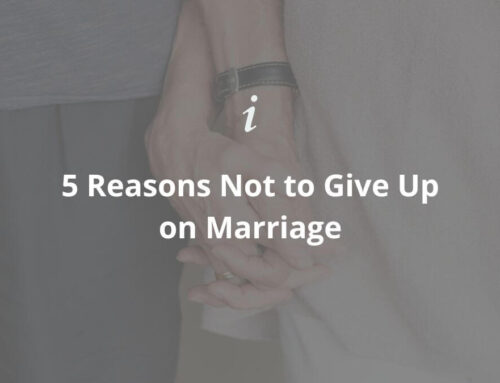How A Miscarriage Affects A Marriage
Don’t have your headphones or a private place to listen right now? Check out the conversation below!
A miscarriage may be one of the most difficult things a couple goes through. It is a loss that ebbs and flows with the waves of grief.
In today’s conversation, Marriage Helper CEO, Kimberly Holmes, & Spark of Life Founder, David Mathews, discuss the grief that comes with a miscarriage and how to best care for someone who is experiencing this type of loss.
The Importance Of “Context”
Kimberly Holmes:
David, do you think it’s one of the hardest things for a couple to go through?
David Mathews:
It depends on the context. Yes. That’s what we’re going to talk about. The stats are anywhere: 8% to 20% of pregnancies end in miscarriage. And what we have heard is a lot of people… a lot of husbands will (or might) say, “Well it happens to everybody.” So, it depends on the context. Some people miscarry and they don’t know they’re pregnant. They probably are not going to experience deep, emotional, long term grief. But then again, they might because of context. Maybe they had a miscarriage and they didn’t know they were pregnant and then they found out they were pregnant and then they can’t have any other children.
Kimberly Holmes:
So you could even grieve it after?
David Mathews:
Oh, yes. You may wonder if you can’t have any other children.
David Mathews:
We saw a couple that has four healthy kids after an initial miscarriage- It’s still a loss to them. And at the time it was very devastating, perhaps, to the couple. But again, context. Years later… They tried 10 years to have a child, and they tried to adopt, or they don’t want to adopt. And there’s so many variations. Not one way works for everybody. Some women will get pregnant immediately afterward. And then some never get pregnant again. So it all depends on the situation. But it all comes back to the same thing: permission to grieve AND don’t compare your losses to others.
Don’t Compare Losses
David Mathews:
I’ve had people who’ve lost children say, “Well, at least you didn’t get to know them. Once you get to know them and you lose a son (or grandson) at 10 years of age it’s harder than if you never knew them…” Well, in one sense it’s different. It’s a stop in a familiar pattern of behavior. For example, if one of our kids loses a child that’s 10 years old… 13 years old… their whole life switches. If you lose a baby, an infant, it’s different. But you’ve still lost- you’ve lost the future, you’ve lost dreams, you’ve lost all that other stuff. So it all comes back to the same thing: don’t compare losses.
David Mathews:
I had somebody tell me, “At least you didn’t know Josiah.” And I went, “What does that mean!? ‘At least I didn’t know.” I would’ve rather known him than not know him! And they said, “Oh no you wouldn’t because then your whole life is …” There’s no win in that, to compare. There’s no win. It doesn’t help anybody to compare.
David Mathews:
Here’s an example:
Now, If my loss is worse than other losses, I might not ever recover because I think I can’t because I’ve experienced the worst.
Those who’ve lost children are probably the worst in thinking their loss is worse than everybody else’s so “nobody can relate to me…” But then I can one up that, those who’ve lost children to suicide. Right? They think they have the worst loss. Those who’ve lost all their children have the worst loss. Those who lost their children and their spouse. We’ve had people whose spouse killed the kids and killed themselves. Okay, so is that the worst one? See, it’s no end. There’s NO END to that.
Kimberly Holmes:
They’re just all different.
David Mathews:
They’re all different and stop comparing losses. The same thing goes with miscarriage. If somebody tries to say, “Well, at least you can have other children.” Number one, they don’t know that. Number two, it doesn’t matter. Don’t tell me that “at least you have eight other children.” Don’t tell me that. I know that I don’t have a broken brain. I have a broken heart. Comparing losses just doesn’t help anybody. It’s not a win for anybody to compare.
David Mathews:
Somebody brings up, “Well, a friend of yours had six miscarriages and they don’t have any children.” Okay. What does that mean to my loss? See, if I lose a child to miscarriage, I’ve lost a child. And it’s not being cold, but it doesn’t help me to say, “Well, here’s somebody who’s lost 10 kids in miscarriage, 10 miscarriages. They don’t have any children. You have two other children,” for example, that doesn’t help me. I’m still grieving the loss of my child. And it’s in context, again, as everything else is.
The Importance Of “Context” Revisited
Fear Of The Future & Identity
David Mathews:
For example, what if somebody was adopted and their adopted parents could not have children… So then she grows up, gets married and has a miscarriage in her first pregnancy? She might be fearful she can never have children again. Right? And she’s grieving not only the loss of this child, she’s grieving the future… and now she’s worried about the future. And if her husband is insensitive to that and says something to the effect of, “Well honey, we can have other children and this happens to everybody.” Right? He’s not even understanding the context. Plus he’s not understanding the identity issue.
David Mathews:
It could become her whole identity and now what she thinks she can be good at, like being a mom, is taken away from her. And if she has fear that maybe she can never have children, okay? That’s context.
Loss Piled Upon Loss
Kimberly Holmes:
We had really good friends when we were in the military. All the wife wanted was to get pregnant and have a kid. For the first seven years of their marriage, they were moving a lot- he was in flight school. I mean, it was pretty crazy. Then, he was transitioning out of the Army… Anyway, all this stuff was happening and she ended up getting pregnant after struggling with getting pregnant for several years. At first, her husband was excited. But then, she ended up having a miscarriage and his response to that was, “Thank goodness.”
David Mathews:
Wow.
Kimberly Holmes:
And that-
David Mathews:
Loss piled upon loss.
Kimberly Holmes:
Oh my gosh.
David Mathews:
Loss piled upon loss.
Kimberly Holmes:
That led to the breakdown-
David Mathews:
Of their marriage.
Kimberly Holmes:
… of their marriage.
Stories Of Loss & Not Expecting Your Spouse To Grieve In The Same Way
David Mathews:
We had a couple come to one of our “Spark Of Life” Retreats. She had had six miscarriages. She was afraid to get pregnant again. She could not go through the emotion. Her mother couldn’t have any more children after she was born. So she has all these fears. On the other hand, her husband… He is determined. She says, “We can adopt.” And he says, “Over my dead body are we going to adopt. I want a child from my bloodline.” He was the last male.
Kimberly Holmes:
So, he had a story…
David Mathews:
He had a story. His father and mother demanded that he have a son, “You got to have a son. You got to have a son, or the name goes away.” (Goes away, as it were, the “blood line.” And that used to be a bigger deal than it is today. But it’s still a big deal for a lot of people.) So his story is, “Over my dead body will we adopt a kid.” Her response to that is, “He doesn’t care about me. He doesn’t understand anything about me. I am scared to death to get pregnant again, get my hopes up and go through another miscarriage. I can’t do it.” Do you think that affected their marriage?
Kimberly Holmes:
Absolutely.
David Mathews:
So they came to our retreat. (We have a good ending to this story!) Once he gave his wife permission to grieve the way she needed to grieve, and started to understand her loss story their situation turned around.
David Mathews:
In our retreats, everybody has to go through their “loss story.” When you look at someone’s loss story you begin to understand where they’re coming from, “Ah, this makes sense. This makes sense now.”
David Mathews:
Everything’s in context, giving yourself permission to grieve, and not expecting your spouse to grieve the way you grieve. That’s a big deal with marriages and why miscarriages can really affect marriages in a way that, as we said earlier, later on, such stuff comes out and you might not relate it back to the loss. But oh, it’s relatable back to the loss.
Differences Between The Loss As A Mother & The Loss As A Father
Kimberly Holmes:
David, what do you see about sometimes, probably a lot of the time, the woman handling it harder emotionally than the husband? But sometimes it might be the opposite?
David Mathews:
Well, in this case, they were both devastated.
David Mathews:
So a miscarriage is not only the woman’s loss, it’s also the husband’s. But I would say generally speaking, I would say probably, not always, the woman might experience a deeper emotional loss than the husband. But don’t discount his grief either. Sometimes, he hides his grief. For example, “I got to get up and go to work. I got to take care of the family, I got to do all this.” In every situation, that seems to come out. And it leads to the man controlling the wife and then telling her how to grieve and thinking she’s weak because she’s not over it.
An Example Of What Happens When Someone Isn’t Given Permission To Grieve
David Mathews:
We had a couple come to our church leadership for prayer. The story was, six months earlier they had their first pregnancy. They were super excited, but then, she had a miscarriage… Six months later, she comes to the church leadership for prayer. (It just so happened that this particular church leadership was all male. So here’s the female with a bunch of males, including her husband.)
David Mathews:
She said, “I just can’t stop crying. I just can’t stop crying.” And I [David] was sitting there dreading the first response by our leader for that month. And he did exactly what I was afraid of…
David Mathews:
He said, “Well at least you’re young and you can have other children.” And then he said, “And looking around this room, many of us have been through that. It’s very normal to have a miscarriage.” After that, she shut up. Her countenance changed. We finally prayed with her, but she was completely shut down after that.
David Mathews:
Afterward, I met them out in the hall as they left. And I said, “I’m so very sorry for what was said to you in there.” And she said to me, “You want to know why I’m here today? I went to my doctor this morning, and he told me, ‘It’s been six months, get over it. Everybody has miscarriages.'”
Kimberly Holmes:
No way.
David Mathews:
Yes. So I asked her, “So your doctor’s a male?” She said, “Yes.” I said, “Fire your doctor. Get a female doctor who will understand.” I did, I told her that. And it also turned out later in counseling that her husband had basically said the same thing, “Honey, look at all your friends that have had miscarriages. It’s time to get up and live again.”
Kimberly Holmes:
Oh, no.
David Mathews:
See, he’s trying to fix her. And when you try to fix somebody, you’re telling them, “If you’re as smart as me, you wouldn’t be grieving as bad.” Then the church leadership also said, “God won’t give you more than you can handle.”
Kimberly Holmes:
Oh, stop.
David Mathews:
Yes, we hear that all the time. One thing I don’t believe is that God gave them that. Now, God can do what he wants to. Right? But everything that happens is not that God directed it. Sometimes accidents happen, sometimes things happen. It’s not that God’s giving it to them.
David Mathews:
There’s another thing we hear all the time about miscarriage… is a lot of miscarriages means something’s wrong with the baby. So when a woman has a miscarriage and somebody says that, that’s denying their grief. That’s saying, “You don’t have a right to grieve because God did you a favor by taking the baby.” Which I don’t believe God did that. Right? You get what I’m saying? And it’s just awful.
David Mathews:
So, back to the story from earlier…
- She lost her baby
- She’s being told that she’s weak even though he never said the word weak. Right? Trying to fix somebody means, “If you were as smart as me.”
- She heard the church leadership say, “It’s a faith issue. If you had greater faith, you wouldn’t feel so bad.” So now she feels guilty.
So now she takes on guilt and has this big ball of grief.
David Mathews:
So what can a husband do? Be there.
David Mathews:
How do you be there? Physically, intellectually, emotionally, spiritually. Let them grieve.
Giving Someone Permission to Grieve
David Mathews:
A person that came to one of our first grief retreats we ever had was back in 2009. She walked into the room. She had lost a baby to stillbirth. Which, it’s similar to a miscarriage. I mean, there’s so many different levels of this. She had lost a child to stillbirth and she said, “I want everybody to know that if this is a religious retreat, I’m out of here because I hate God.” So if somebody says, “I hate God,” what should you do?
David Mathews:
Here’s what you should do: Shut up, be there, and say, “I’m so sorry. You’re welcome here.” I should not try to talk her out of her feeling of hating God.
Kimberly Holmes:
Because there’s always a story behind it.
David Mathews:
There’s always a story. On Sunday at the end of the retreat, she said, “I want everybody to know I don’t hate God anymore. I’m not real fond of him, but I don’t hate him anymore.” That’s progress, right?
Kimberly Holmes:
That’s huge progress.
David Mathews:
That’s a normal and natural response to loss. So, it’s okay. At our retreats, we’re just there for them. Nobody condemns anybody at our retreats because everybody’s there with loss. So it’s okay for you to have your feelings. We don’t assume the person is being self-centered or insensitive. They come across that way, but that’s not what’s really happening. It’s back to the core issue. What is really the core here? What’s going on?
CPR: Context, Permission To Grieve, Restart/Reframe
Kimberly Holmes:
David, what you’ve talked about before is the acronym CPR. So, in this situation, it would be finding the context- that backstory, giving them permission to grieve, and then restarting.
David Mathews:
Restart, reframe, you could even say refrain- refrain from trying to “fix.” But reframe in the sense of, “This is a terrible situation. We’re both grieving in our own way.” It’s okay to grieve the way I need to grieve, but I’m here for you. Right? “I’m not trying to fix you. I’ll just be here. You can have any feelings you want.” You can just feel intimacy growing through a very terrible thing if we stop trying to fix each other, if we give each other permission, if we try to understand the backstory. And if we don’t understand the backstory, accept the fact that they have a backstory. Everybody has a story.
David Mathews:
Everybody has a story. Once a person feels accepted, that someone knows their story, and supports them in their way of grief, they can “restart” more easily. Now, they still may need to restart again and again, but they can begin to move forward; finding a place of hope for the future.
What Grievers May Be Feeling
David Mathews:
See, grievers feel, “What’s wrong with me?” They think, “What’s wrong with me?” Because their friends say, “Well, so-and-so has greater loss than you. They have six miscarriages. You’ve only had one.” Or they say something like, “It’s been a year. Get over it.” Right? Or the doctor says, “It’s been six months.”
David Mathews:
Well, number one, everybody doesn’t have miscarriages. And number two, you just don’t tell somebody to get over it. Right? It makes grievers feel like there’s something wrong with them. “What is wrong with me?” If I was a better person…
David Mathews:
We had one case, where the woman had an abortion in college. That went against her belief and values. And she had tremendous guilt- told me this in the office. So, years pass… She’s dealing with this, but keeps it stuffed up inside. She gets married, they get pregnant, and then she has a miscarriage. So her back story is, “Maybe my abortion hurt me to have healthy babies.”
David Mathews:
So now, she already felt guilt and now she feels guilt upon guilt. Her boyfriend made her get an abortion. She didn’t want an abortion. He drove her to the abortion clinic. He forced her to do this. She gave into it because she was afraid she was going to lose him. And then after the abortion, he never talked to her again-
Kimberly Holmes:
Oh my goodness.
David Mathews:
-dumped her, in college. So now she has this inward hate of men. Okay? That’s part of her backstory. And I know we’re kind of jumping around here, but it all fits together. It all fits.
“What would you tell a woman who feels like her husband ‘doesn’t get it’ and isn’t hearing her… What can she do?”
Kimberly Holmes:
So, what would you tell a woman listening to this? So, not the husband, but the woman saying, “My husband doesn’t get it. He’s not hearing me.” What can she do?
David Mathews:
I think that’s tough. It’s easy for me to give answers and I understand how complex it can get because of all the stuff we’ve said. First of all, I think she has to give herself permission to feel the way she feels. Second of all, she might get some grief coaching. We do grief coaching. She might get some marriage coaching through Marriage Helper, our grief coaching from Spark of Life, or both. And then learn how to talk to her husband about, “I need to grieve the way I grieve.” Or maybe get her husband to watch this video, for example. Try something in order to help him understand and be patient with him too. Because he doesn’t know what he’s doing.
David Mathews:
But he’s hurting too. He’s grieving in his own way. It’s really hard in those situations, but it can be done. We’ve seen it. When couples come to a retreat, often, a grief retreat that we do. Often, often the husband doesn’t get it beforehand, but he gets it at the retreat. And sometimes the wife doesn’t get he’s grieving as well. So coming to something like that, or our online course on grief can really help. But I think this video could help him maybe, a little bit.
Kimberly Holmes:
At least begin to.
David Mathews:
Begin to get it. Yeah. And be patient with each other. But she has to be pretty strong in one sense by admitting she’s weak. Right? And admitting she needs help.
Stories of Hope & Turnarounds
Put The Focus On You. Accept The Feelings Of Your Spouse. Do Not Try To “Fix” Your Spouse.
David Mathews:
It’s hard. It’s difficult. But it can be done. We see turnarounds all the time. We see it in the Marriage Helper Workshop, I mean, I tell everybody about that. All that we do in the Marriage Workshop helps people focus on them and accept the feelings of their spouse and stop trying to fix the spouse. Stop trying to fix. Because it’s a control thing and we don’t mean to control, but we do.
Kimberly Holmes:
We love our partnership that we have with David and Debbie and Spark of Life. If you want to know more about the retreats that they do, that he’s been talking about, which are just amazing, they’re amazing places around America, beautiful places. They’re three and a half days, and it’s powerful. If you want to know more about that or about the online course. If you’re saying, “Well, I can’t travel right now, but I need something to help me through.” Right now, then please go to SparkOfLife.org and check out what they offer there. We recommend them; we back them 100%.
David Mathews:
By the way, the online course has three coaching sessions built in with it.
Kimberly Holmes:
So if you want more about that, please go to SparkOfLife.org. And David is also our Workshop facilitator, he does many of our workshops that we have here in the Tennessee area, but he’s also one of our marriage coaches as well. So we are blessed to have him and Debbie, his wife, on our team.
Kimberly Holmes:
We would love to help you overcome whatever loss you’re experiencing, especially if there’s been a miscarriage in your marriage and you’re just, you can’t figure out how to move forward. If you want more information about the Spark of Life, please visit: https://www.sparkoflife.org
If you’d like more information on our Marriage Helper Workshop & Resources, please visit: https://marriagehelper.com/marriage-seminar/




